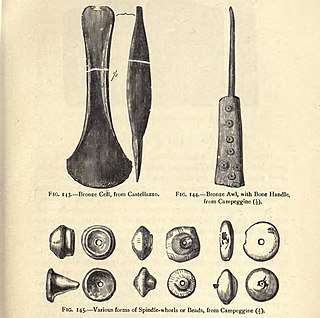Robert Munro (archaeologist)
Dr Robert Munro FRSE FSA LLD (1835-1920) was a Scottish physician and noted amateur archaeologist.[1]

Life
He was born on 21 July 1835 at Assynt in Rossshire, and educated at Kiltearn Free Church School, and at the Royal Academy in Tain.[2] He studied Medicine at the University of Edinburgh graduating MA in 1860 and MB ChB in 1867.[2] He worked as a General Practitioner in Kilmarnock until 1886, when he turned his whole attention to archaeological research.[3] He was a member of many learned societies at home and abroad and published several books on the subjects of his research.[3]
In 1891 he was elected a Fellow of the Royal Society of Edinburgh.[2] His proposers were Rev John Duns, Sir Arthur Mitchell, Alexander Buchan and Ramsay Heatley Traquair.[2] He served as Vice President of the Society 1903 to 1908.[2]
In 1912 Munro began lecturing in Anthropology and Prehistoric Archaeology at Edinburgh University.[2]
He died on 18 July 1920.[2]
Family
In 1875 he married Anna Taylor (d.1907).[2]
Publications
- Ancient Scottish Lake Dwellings or Crannogs (1882)[3]
- The Lake Dwellings of Europe: being the Rhind Lectures in Archaeology for 1888 (1890)[3][4]
- Rambles and Studies in Bosnia, Herzegovina and Dalmatia, with an account of the Proceedings of the Congress of Archaeologists and Anthropologists held at Sarajevo, August 1894 (1895)[3][5]
- Prehistoric Problems: being a selection of essays on the evolution of man and other controverted problems in anthropology and archæology (1897)[3][6]
- Prehistoric Scotland and its Place in European Civilisation (1899)[3]
- Man as Artist and Sportsman in the Palæolithic Period (1903)[7][8]
- Archaeology and False Antiquities (1905)[9]
- The Munro Bequest (1910)[4]
- Palæolithic Man and Terramara Settlements in Europe: Being the Munro Lectures in Anthropology and Prehistoric Archæology in Connection with the University of Edinburgh, Delivered During February and March 1912 (1912)
- .
- From Darwinism to Kaiserism: being a review of the origin, effects and collapse of Germany's attempt at world-dominion by methods of barbarism (1919)[10][11]
- Autobiographic Sketch of Robert Munro, M.A., M.D., LL.D., 21st July, 1835 - 18th July, 1920 (1921)[4]
Munro wrote articles for the 1911 Encyclopædia Britannica, attributed by the initials "R. Mu".[12]
References
- "MUNRO, Robert". Who's Who. Vol. 59. 1907. p. 1275.
- Biographical Index of Former Fellows of the Royal Society of Edinburgh 1783–2002 (PDF). The Royal Society of Edinburgh. July 2006. ISBN 0 902 198 84 X.
- "Munro, Robert". The Encyclopedia Americana. 1906. Retrieved 25 August 2010.
- Magdalena S. Midgley; Jeff Sanders (2012). Lake Dwellings After Robert Munro: Proceedings from the Munro International Seminar : the Lake Dwellings of Europe, 22nd and 23rd October 2010, University of Edinburgh. Sidestone Press. pp. 16–. ISBN 978-90-8890-092-1.
- "Catalogue description". The National Archives. Retrieved 1 January 2018.
- F, W (1897). "Reviewed Work: Prehistoric Problems: Being a Selection of Essays on the Evolution of Man and Other Controverted Problems in Anthropology and Archæology by Robert Munro". The Journal of the Royal Society of Antiquaries of Ireland. 7 (2): 195–197. JSTOR 25508408.
- "Man as Artist and Sportsman in the Palæolithic Period". Proceedings of the Royal Society of Edinburgh. 25 (1): 92–128. 1906. Retrieved 1 January 2018.
- Munro, Robert (1912). Palaeolithic Man and Terramara Settlements in Europe. Retrieved 1 January 2018.
- "Archaeology and False Antiquities". Internet Archive. Retrieved 1 January 2018.
- Julian Walker (28 December 2017). Words and the First World War: Language, Memory, Vocabulary. Bloomsbury Academic. pp. 161–. ISBN 978-1-350-00193-0.
- "From Darwinism to Kaiserism: being a review of the origin, effects and collapse of Germany's attempt at world-dominion by methods of barbarism". Google Books. Retrieved 1 January 2018.
-

External links

- Works by Robert Munro at Project Gutenberg
- Works by Robert Munro at Archive.org